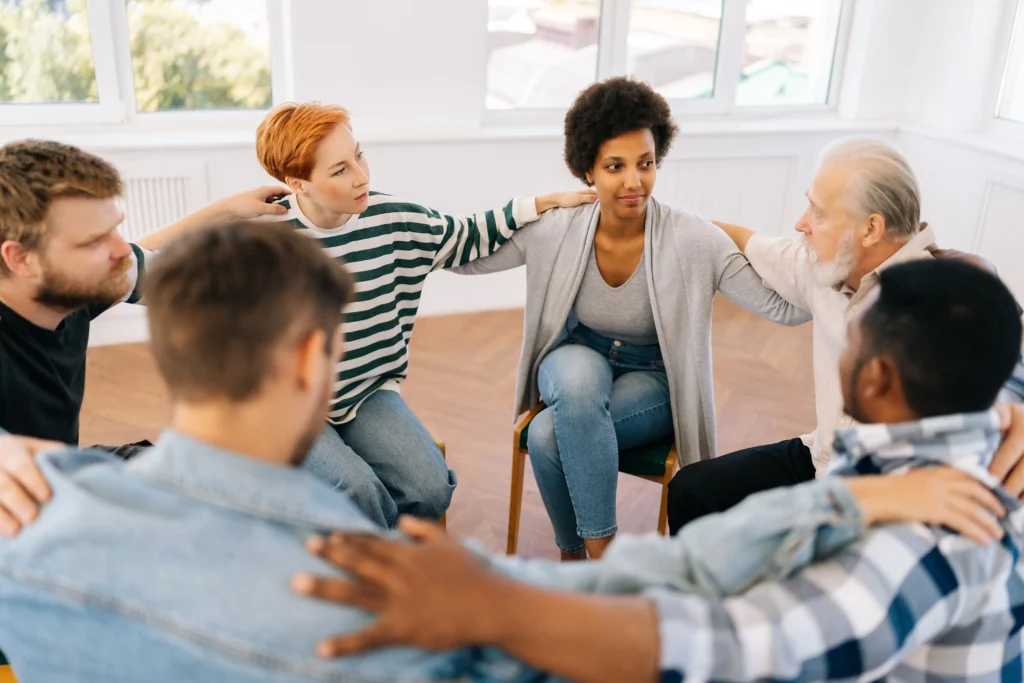- Programs
- Locations
- What We Treat
What we treat
- Insurance
- About
- Online DUI Classes
Losing someone or something profoundly meaningful fills the space that once promised more hellos with the agonizing emptiness of having said a final goodbye. In the aftermath of impactful Loss, the persistence of sorrow, heartache, and pain permeates the body, mind, and soul. Getting through a single day in the early stages of Grief feels like trying to walk through waist-high mud while carrying heavy weights—an uphill battle. Numbness offers some relief while waves of anguish come crashing without notice, triggered by familiar songs, scents, and empty rooms. Loneliness swirls, although loving friends surround survivors. Achieving understanding remains difficult when the story no longer makes sense, left unfinished mid-sentence without the person meant to be beside you in the next chapter and all those after. 1
Grief constitutes a natural, though intensely painful, response to experiencing Loss through the death of a loved one, relationship breakup, job loss, infertility, or other profound life transitions. While commonly discussed relative to bereavement, Grief permeates all impactful Losses that shatter certain hopes, dreams, and assumed life trajectories.
Typical reactions involve distressing emotions from sadness and yearning to guilt, anger, and anxiety plus disrupted sleep, changes in appetite, fatigue, tearfulness, avoidance of reminders, and decreased concentration. For most, acute symptoms lessen over the first months after a Loss as acceptance enables emotional reorganization. However, complicated Grief persisting extensively with serious functional impairment may require clinical intervention when healing stalls.1
The intensity of Grief reactions depends heavily on the nature, timing, and other circumstances surrounding a specific Loss combined with individual factors that shape resiliency. The death of a child or spouse often overloads available emotional coping capacity. Traumatic or unexpected Losses usually intensify symptom severity, seen vividly after mass shootings, disasters, homicide, or suicide. Pre-existing blood-relative mood disorders, anxiety, PTSD, or substance abuse issues leave survivors prone to complicated Grief with entrenched depression, post-trauma symptoms, or addictive behaviors that demand targeted treatment.
Additionally, lack of social support and concurrent stresses like financial hardship or isolation act as risks. Cultural elements that discourage emotional expression prolong the Grieving process as well.2
When painful Grief persists extensively without expected improvement over the first six months, clinical diagnoses become necessary to guide appropriate interventions. Mental health professionals assess complex, prolonged Grief reactions for depth relative to cultural and social norms through interviews, questionnaires, and reviews of functioning levels across major life domains.
They identify coexisting conditions like major depression and post-traumatic stress that may require simultaneous treatment for comprehensive healing. Maladaptive coping in the form of self-medication with food, alcohol, or other substances often co-occurs. Exploring family patterns of Grief provides additional contextual clues on the primary diagnosis and optimal, personalized next steps to reconcile the Loss.3
Ongoing, unrelenting feelings of sadness, emptiness, and emotional pain persist, making even basic functioning extremely difficult.
A prolonged sense of shock and denial continues as the mind struggles to accept the permanence of loss months later.
Marked disinterest and withdrawal from close relationships, work, and enjoyable activities point to profound depression and isolation.

At Cornerstone, we understand Grieving is an intensely personal journey that follows no rigid timeline. That’s why our Arizona treatment centers in Scottsdale and Phoenix offer customized Grief and Loss therapy integrating research-backed modalities with holistic creative practices to nurture mind, body, and spirit. Our compassionate team has developed tailored plans for individuals and families struggling with the loss of a loved one, divorce, career shifts, and other wrenching life transitions. Whether participating in intensive outpatient or residential programs, you will find refuge, hope, and a judgment-free space for processing complex feelings. New coping skills and meaning-making emerge through a combination of talk therapies, mindfulness, and creative expression support groups. If the ups and downs of profound Loss have started to drown your days, we remain anchored in sensitivity and understanding. You don’t have to walk this long road home alone when we can safely guide the way.




Lionel, a Licensed Independent Substance Abuse Counselor (LISAC) with over 4 years at Cornerstone, specializes in addiction and mental health. Trained in EMDR therapy, he employs a trauma-informed, empathetic approach to address underlying causes of these issues.
Here are some signs that it may be time to consider inpatient or residential treatment for Grief and Loss:
The compassionate care and focused treatment available in an inpatient or residential Grief program can help stabilize symptoms and shift the Grieving process in a healthier direction when outpatient options prove insufficient. Speaking with a therapist can help determine the appropriate next level of care.
Here are some ways you can help support a Grieving loved one who needs treatment:
The compassion of loved ones eases Grieving treatment through this challenging journey full of unpredictable setbacks and strides forward. With time and care, hope persists.
Our admissions specialists are here to explain the process, answer any questions you may have, and ensure you’re getting the help you need to live a healthy life free from addiction.

